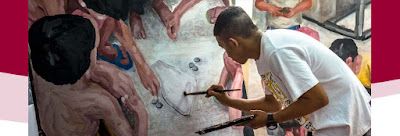As a Senior High School student, it has been quite difficult for me in choosing a rightful strand/track because at first, after Junior High was over, we thought that we were finally free for a moment. But then again, Senior High happened. When the NCAE results were released and someone had told us what the NCAE was for, we were all shocked because some of us didn't take the exam seriously. A few of us were having troubles while a few of us were laughing and amused by the results. The teacher also told us the NCAE result doesn't really define what strand you should be in, but in some schools they examine it whether the student is qualified enough to pursue the strand that the student was going to take. I had to search about different strands that suits me, and I think I have already asked everyone I know about what each strands are capable of. To make the story short, a few days before the enrollment, the time had come and I have made up my mind. I have decided to choose Science, Technology, Engineering and Mathematics (STEM). I made this blog for a reason, and that reason is to help the incoming Senior High School students to choose what strand/track they would like. a few tips are listed below:
1. Undergo research about the different strands/track.
Performing research before choosing is advantageous knowing that you have already understood the potential of each strand/track. Each one harnesses their own specialty whether it's math-related, arts-related, or sports-related. The SHS strands/tracks are listed below:
a) Science, Technology, Engineering, and Mathematics (STEM)
b) Accountancy, Business and Management (ABM)
c) Humanities and Social Sciences (HUMSS)
d) Technical Vocational and Livelihood Education (TLE/TVL)
e) Arts and Design
f) Sports
You can find a lot of helpful information in this website, here.
2. Look for a school that is suitable for you.
Each school have their own specialty according to what field they focus on. If you want to study aeronautics, then enroll in a school that focuses on aeronautics. This can help you enhance your skill according to what you desire, this can help you throughout your college years. Searching for a school that suits you has an impact especially after graduation. But be aware that it does not depend on which school you enter, it still depends on your potential as a student.
3. Acquire beneficial information from Senior High School Students.
Asking help from a senior is really helpful especially on these kinds of cases. If you are having troubles in choosing, you can ask them according to their experiences. You can ask someone who is close (or not) to you in person, or you could engage a conversation online. Just have some respect and ask for permission before asking them for advice.
4. Identify your field of interests.
What are the things that suits your interest? Knowing your interest can help you withstand the hardship after deciding. Whether you enjoy speeches, designing, solving, or cooking, it's really up to you. You can undergo self-assessment tests, or go base on your NCAE results if you answered it seriously, but it's really up to you, and only YOU.
5. Set your goals.
Having a plan or goal does not only help you choose the proper strand but it can also help you in becoming a better person in life. If you aspire on becoming a doctor, engineer or maybe a flight attendant, setting your goals straight can help make your decisions and inspire you to achieve it. Visualize what could happen if you what you were expecting actually came true. It will surely be the fruit of all your hardwork. If you want to search for the possible college courses according to your strand/track, you can look for it here.
Please take note that everything might not be listed there, so feel free to search. I hope it helps!
6. Analyze the subjects included in each course.
After creating a shortlist of some strands or tracks from the senior high school curriculum, you must dive deeper into each track’s core. Are you looking forward to study the subjects listed under your chosen track? However, if you do not see yourself taking its prescribed subjects, take a step back and select other tracks with subjects to suit your liking.
7. Follow your heart's content.
If you do something to your heart's content, you will do something enjoyable for as long as you want to do it. Think about how your skills and talents as well as your hobbies take part during the academic year. Just enjoy what life has to offer. Live the life you love and love the life you live.
"Once you make a decision, the universe conspires to make it happen."
- Ralph Waldo Emerson







